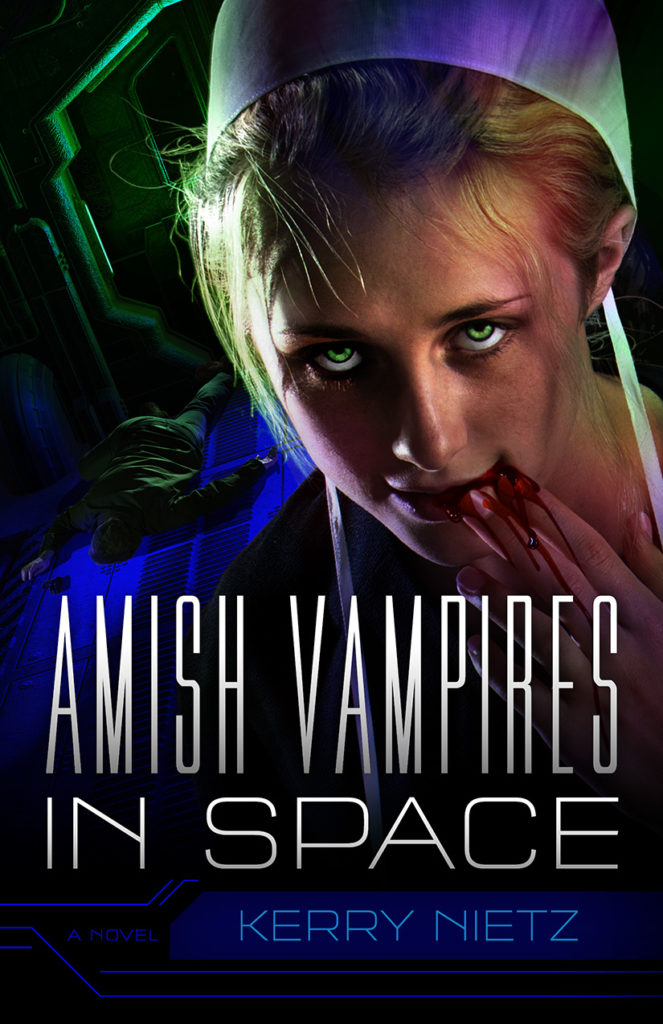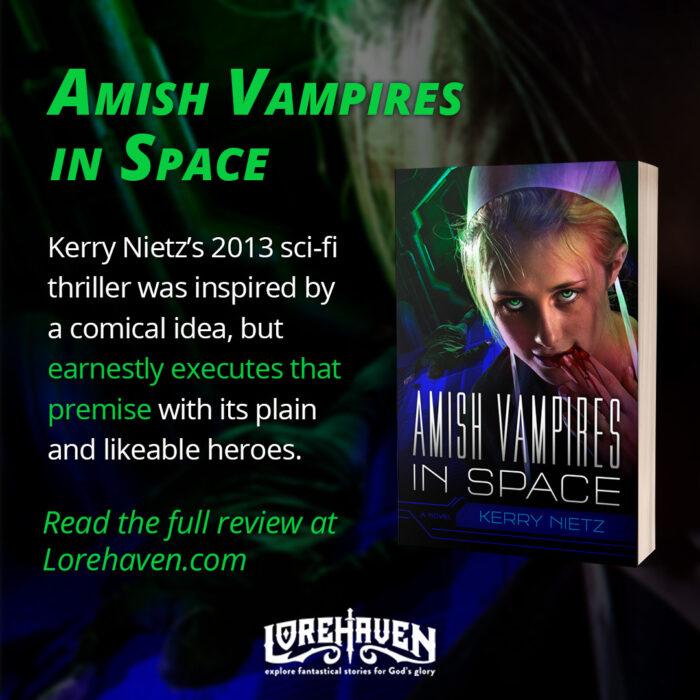Kerry Nietz’s 2013 sci-fi thriller was inspired by a comical idea, but earnestly executes that premise with its plain and likeable heroes.
You might bend the laws of physics, but Jebediah Miller was always taught never to break the Ordnung rules. But he feared even more the destruction of his world. That’s why he pushed the button. That’s why he summoned those outsiders to the Amish settlement on Alabaster—a contingency plan to rescue the technologically impaired community and relocate them to a less supernova-prone system.
Alas, this act still brings condemnation. Jeb and his wife Sara can still evacuate with the others aboard the Delivery Guild vessel Raven. But they’ll need to stay in a cabin separate from their people. Once beyond orbit, however, it seems an old-fashioned shunning is no match for new-fashioned techno-horrors lurking in the corridors.
Kerry Nietz fetches laughs with the premise, title, and original cover image of his 2013 sci-fi thriller Amish Vampires in Space. But please don’t point and stare. After a slow start, this story gains momentum until Nietz rights the ship into a classic-feeling outer-space creature feature, complete with secret labs, strange alliances, and the constant threat that innocent victims could turn into vamping predators.
This horror, however, doesn’t jump-scare for its own sake. Yes, a genuine threat of vampirism stalks this community for whom we have come to care. But we also find real clashes between pacifism vs. self-defense as well as genetic engineering. By the end, Nietz with his serviceable style lands the story quickly and resolutely. Crewmen do their duty. Wicked vampirism is vanquished. And the Amish heroes show their resilience—belying potential complaints about their original cover-art presentation.
After its original publication, AVIS gained some infamy. One paperback featured for fifteen minutes on nationwide late-night comedy; host Jimmy Kimmel queried: “Do we need yet another Amish/vampire space book?” Yes, we might, though Nietz set his sights on other monsters, going on to release Amish Zombies from Space and Amish Werewolves of Space. Sci-fi and especially horror tales continue to fight for Christian fantasy-fan attentions, yet perhaps this genetic splicing marks an exception to the lab rules. This serious novel with a comical name ends up a barn-raising success.
Best for: Adults and older teen readers un-spooked by sci-fi vampirism.
Discern: Creature violence, horror and other thematic elements, disputes between Amish and others over topics such as cultural participation and self-defense, scant descriptions of vampirism-afflicted Amish persons acting in provocative ways, ethical challenges related to human genetics tampering.































I loved this book. Yes the title is corny but the book is no such thing. It’s not satire or comedy of any kind. It really is a serious book that deals with three completely different cultures being thrown together on one ship. It is very entertaining and fun to read. A book written by Kerry Nietz should be good enough reason to give it a try.
Nietz has once again penned a provocative, well-hewn plot with characters you truly care about facing extraordinary circumstances. It’s both smart and fun, but contains a few flaws that hold this good tale back from reaching its fullest potential.
I must admit I’m biased in Nietz’s favor, being a major fan of his Dark Trench saga. His greatest strength lies in putting the “science” in “science fiction,” producing works that go beyond genre tropes to both entertain and inform. Yes, there’s some suspension of disbelief involved; it’s a novel, not a research paper. Nevertheless, I admired the length to which Nietz put obvious care in developing the story elements, vampire plague and all. The setting and characters were all fully realized, whether terrestrial or in space.
This book is the first Nietz wrote in third person, which may explain its uneven style. Many times I felt the narrative straining to return to first person; there were times in my eBook copy that a lack of formatting made that change abruptly. While the author’s favored short, choppy sentence structure worked well for his earlier first person narratives as an extension of the narrator’s thoughts, they worked against him with multiple character view points to juggle. While the Amish and “Englisher” characters spoke differently, their internal voices sounded very much the same, sometimes in confusing ways.
It’s no spoiler to reveal that Jebediah is shunned for his violation of the Amish’s rules against the use of technology. The story shines best with this quandary, as it explores both pros and cons for this way of life. But as the vampiric scourge spreads Alien-like through the ship, Jebediah and the other Amish characters face a true crisis of faith in regards to their pacifism. This argument is not as nuanced; in fact, the basic conflict becomes one of pragmatic realists who fight back versus well-meaning but delusional idealists who advocated against the use of force. While the premise that basic physical survival is an end unto itself is not out of place in such a story, I found it odd that the Christian characters (Amish or not) didn’t counter with the belief that death is not the end of life, or brought up the importance of martyrdom in the faith’s history.
Despite these moments of weakness, the novel is captivating and addictive. I was hooked from the moment it began, and and the tension steadily ratcheted upward to create real terror. The influences of Ridley Scott and Michael Chriton are both felt, and characters continually surprised with hidden motivations and depth as the story progressed. Acts of valor and cowardice were evenly spread and heartfelt. My favorite character proved to be the unflappable ship’s doctor Darly, a tough woman who resisted all attempts (human and vampiric alike) to derail her work. There are some genuine twists I didn’t see coming, and a bold ending that didn’t tidily resolve all the conflicts introduced. I would be more than willing to further delve into this story’s multiple worlds should Nietz be so inclined to favor us with more.